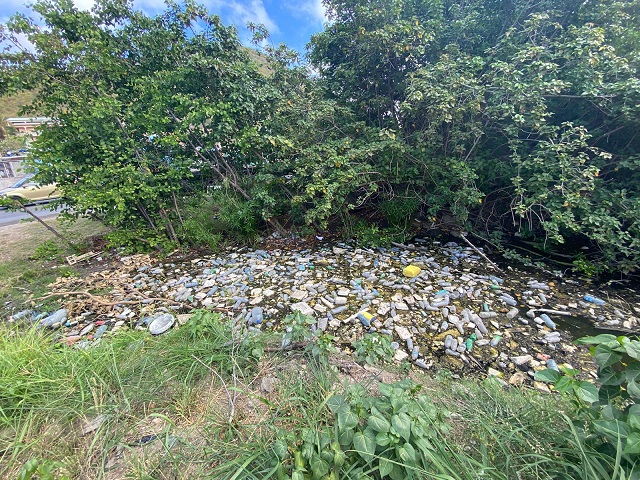PHILIPSBURG, Sint Maarten — The Nature Foundation St. Maarten has continuously seen a disturbing amount of plastic pollution on the island, especially by Zagersgut road located alongside the Fresh Pond, which is also an Important Bird Area for St. Maarten. Various plastic and other litter items were blown into a small inlet in the Fresh Pond disturbing native bird species, fish species and polluting the water causing a serious health concern.
“Arriving and seeing that much plastic in one place was devastating. The pieces were likely blown or thrown into the Fresh Pond individually and then blown into the small inlet where they collected together. Juvenile Slider Turtles were climbing on top of the plastic and swimming underneath it, indicating that all the water was covered and suffocated by plastics,” stated Alice Manley, In-No-Plastic Project Coordinator. “Plastic pollution seen like this can cause negative environmental effects such as harming our native bird species on St. Maarten.”
Birdlife International designated Fresh Pond as an Important Bird Area for St. Maarten (IBA AN002). Due to its low salinity, Fresh Pond supports bird species that are less common in other parts of St. Maarten and the Lesser Antilles. The fresh pond is an especially important roosting, foraging, and breeding ground for many species of wetland birds including Herons, Egrets, Brown Pelicans, Stilts, and Coots. Depending on water depth, the ponds and lagoon shelter populations of fish, molluscs, and small invertebrates that provide a great source of food for the birds. The animals living there are very easily affected by plastic pollution, which will usually cost them their lives.
In addition, humans, are greatly affected by plastic as well. Toxic chemicals like bisphenol A (BPA) leach out of plastics and are found in the blood and tissue of nearly all humans. Exposure to the toxins will increase the risk of certain cancers, can cause hormonal issues, and even increase the risk of infertility and birth defects. Ingesting plastic can also negatively impact the immune system over time. The fish in the fresh pond will have traces of micro-and nano- plastics in them by either accidentally eating a piece of plastic, or mistaking it for their food source. The plastic can then stay in the fish’s stomach, resulting in humans’ indirect ingestion of micro-and nano- plastics. To limit the amount of plastic that is consumed by animals and humans, there will need to be a decrease in the plastic in our environment.
“Plastics can have a detrimental effect on marine and terrestrial life and affect our health, The Nature Foundation St. Maarten is looking forward to the Plastic Ban to be implemented in the near future,” stated Manager Melanie Meijer zu Schlochtern. “The Nature Foundation aims to protect and preserve our environment, and therefore would like to emphasize the negative impacts of having a large collection of plastic such as this one. We strongly encourage everyone to always dispose of their trash and plastics in proper ways which includes closed bins”
In-No-Plastic concentrates on innovative methods to prevent, remove, and reuse of marine plastic litter. Nature Foundation and In-No-Plastic staff will introduce several social strategies to reduce plastic usage on the island by providing information on various social platforms and presenting it to local students and residents. Staff will also monitor the amount of plastic found in our coastal areas over time. In addition, we will monitor and test ocean and lagoon water for microplastics every six months. The results from this water testing would show whether the amount of microplastics in the water reduces at the same rate as the macro plastics, which are removed during community clean-ups.
A consortium of 17 partners and 10 different countries in Europe and the Caribbean make up the In-No-Plastic project. The Nature Foundation will work alongside the Dutch Caribbean Nature Alliance (DCNA), a partner participating in the In-No-Plastic project. In-No-Plastic started October 2020 and is a three-year project funded with a 7.4 Million Euro grant from the EU H2020 research project, funded under the call “Pilot action for the removal of marine plastics and litter”, Topic ID: CE-FNR-09-2020 (Grant Agreement 101000612).
To learn more about this project, you can check out our website naturefoundationsxm.org/education/in-no-plastic-project.
You can also follow the Nature Foundation on social media to keep up to date with our work and learn more about plastic pollution. If you are interested in joining the Nature Foundation’s volunteer list to receive emails about volunteer opportunities, reach out to us at info@naturefoundationsxm.org.






























